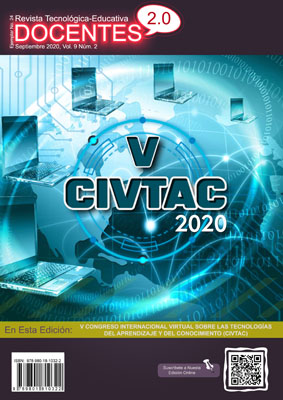Incidence in the Transition from Presential Education to Distance Education Through Technological Tools in the Learning of English Speaking in the Academic Training General English Program of the Technological Center of Cúcuta Students
 DOI:
https://doi.org/10.37843/rted.v9i2.160
DOI:
https://doi.org/10.37843/rted.v9i2.160
Main Article Content
Abstract
With the presence of a new virus (COVID-19), humanity has had the obligation of a technological movility in order to continue with its daily routine. In that way, education has done an inmediate adaptation according to knowledge transfer method. Nowaday, electronic devices are a necessity in every house for those who believe in transformation, no matter what the escenary is. This paper job, is to expose the principal discovery about how the transition to distance education through technological tools has impacted on the academic English program of the CTC students, not only about social aspects but also on studies levels. Using the exploration, analysis and comparison technique, it could be seen how students, teachers and administrative personal are aware about the currently situation and the way they have been adapted into this. In the same way, it is demonstrated that the methodology and pedagogical aspects applied by every teacher of the program inside the new educational system (distance learning) in order to develop the English language skills in the registered individuals, have shown that this process was accepted by the half (50%) of population (according to the first cohort registration) but there is a gradual increase on the following cohorts in which technological tools have been applied, and as a conclusion, as long time goes by and is demanding the new way of studying, the impact among the apprentices tends to be satisfactory.
Downloads
Metrics
Article Details

This work is licensed under a Creative Commons Attribution-NonCommercial-NoDerivatives 4.0 International License.
Those authors who have publications in our journal accept the following terms:
- When a work is accepted for publication, the author retains rights of reproduction, distribution of his/her article for exploitation in all countries of the world in the format provided by our magazine and any other magnetic medium, optical, and digital.
- Authors will retain their copyright and guarantee the journal the right first to publish their work, which will be simultaneously subject to the Creative Commons Acknowledgment License (Attribution-NonCommercial-NoDerivatives 4.0 International (CC BY-NC-ND 4.0)). That allows third parties to copy and redistribute the material in any medium or format, under the following conditions: Acknowledgment - You must properly acknowledge authorship, provide a link to the license, and indicate if any changes have been made. You may do so in any reasonable way, but not in a way that suggests you have the licensor's endorsement or receive it for your use. NonCommercial - You may not use the material for a commercial purpose. NoDerivatives - If you remix, transform, or build from the material, you cannot broadcast the modified material. There are no additional restrictions - You cannot apply legal terms or technological measures that legally restrict you from doing what the license allows.
- Authors may adopt other non-exclusive license agreements to distribute the published version of the work (e.g., deposit it in an institutional archive or publish it in a monographic volume) provided that the initial publication in this journal is indicated.
- Authors are allowed and recommended to disseminate their work through the Internet (e.g., in institutional telematic archives, repositories, libraries, or their website), producing exciting exchanges and increasing the published work's citations.
- Request of withdrawal an article has to be done in writing by the author to the Editor, becoming effective after a written response from the Editor. For this purpose, the author or authors will send correspondence via e-mail: [email protected].
- The author will not receive financial compensation for the publication of his work.
- All Docentes 2.0 Journal publications are under the Open Journal System (OJS) platform at: https://ojs.docentes20.com/.
References
Campoy. (2015). Tecnicas e instrumentos cualitativos de recogidas de datos. Recuperado de: http://proyectos.javerianacali.edu.co/cursos_virtuales/posgrado/maestria_asesoria_familiar/Investigacion%20I/Material/29_Campoy_T%C3%A9cnicas_e_instrum_cualita_recogidainformacion.pdf
Godínez, V. L. M. (2003). Paradigmas de investigación. Recuperado de: http://www.pics.uson.mx/wp-content/uploads/2013/10/7_ Paradigmas_de_investigacion_2013.pdf
Jiménez, D. F. L. (2006). El conocimiento y la comunicación: Dos pilares fundamentales de la organización de la sociedad de la información. 20.
Jiménez, I. V. (2011). La entrevista en la investigación cualitativa: 1, 21.
Kawulich, B. B. (2005). La observación participante como método de recolección de datos. 23.
Kirschner, P. A., Sweller, J., Kirschner, F., & Zambrano R., J. (2018). From cognitive load theory to collaborative cognitive load theory. International Journal of Computer-Supported Collaborative Learning, 13(2), 213-233. https://doi.org/10.1007/s11412-018-9277-y
Loaiza, I. F. P., Caicedo, L. I. B., & Borja, Á. M. R. (2017). Estrategias para implementar las TIC en el aula de clase como herramientas facilitadoras de la gestión pedagógica. 15.
Sáes-López, M. & Ruiz-Ruiz, J. (2012). Metodología didáctica y tecnología educativa en el desarrollo de las competencias cognitivas: aplicación en contextos universitarios. Recuperado de: https://www.researchgate.net/publication/234155371_METODOLOGIA_DIDACTICA_Y_TECNOLOGIA_EDUCATIVA_EN_EL_DESARROLLO_DE_LAS_COMPETENCIAS_COGNITIVAS_APLICACION_EN_CONTEXTOS_UNIVERSITARIOS.
Moreira-Segura, C., & Delgadillo-Espinoza, B. (2015). Virtuality in the educational process: Theoretical reflections on its implementation. Revista Tecnología en Marcha, 28(1), 121. https://doi.org/10.18845/tm.v28i1.2196
Parra Valencia, J. D. (2016). Virtuality: Persistence and Insistence of a new old problem. Eidos, 25, 259-285. https://doi.org/10.14482/eidos.25.7973
Pérez, D. A. Á. (2011). La hermenéutica y los métodos de investigación en ciencias sociales. Recuperado de: http://www.scielo.org.co/pdf/ef/n44/n44a02.pdf.
Portilla, D. (2020). Herramientas de una aplicación móvil de mensajería instantánea para el fortalecimiento del proceso enseñanza – aprendizaje del Inglés. Revista Tecnológica-Educativa Docentes 2.0, 9(1), 116-123. https://doi.org/10.37843/rted.v9i1.109
Q10. (2004). Centro tecnológico de cúcuta.
Mujica, R. (2019). La acción didáctica del docente. Revista Tecnológica-Educativa Docentes 2.0, 2(1), 3-7. Recuperado de: https://ojs.docentes20.com/index.php/revista-docentes20/article/view/46
Mujica, R. (2019). La tecnología en la educación. Revista Tecnológica-Educativa Docentes 2.0, 4(4), 4-7. Recuperado a partir de https://ojs.docentes20.com/index.php/revista-docentes20/article/view/57
Pérez-Serrano, G. (1994). Investigación cualitativa. Retos, interrogantes y métodos. La Muralla.
Suárez, J. C. B. (2006). Pedagogía de la tecnológia. Recuperado de: http://acreditacion.unillanos.edu.co/CapDocentes/contenidos/dis_ambientes_metodos_pedagogicos/Memoria1/nuevas_tecnologias.pdf






